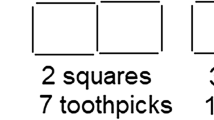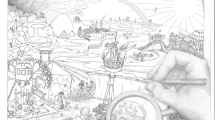Abstract
The Anthropological Theory of Didactics describes mathematical activity in terms of mathematical organisations or praxeologies and considers the teacher as the director of the didactic process the students carry out, a process that is structured along six dimensions or didactic moments. This paper begins with an outline of this epistemological and didactic model, which appears as a useful tool for the analysis of mathematical and teaching practices. It is used to identify the main characteristics of the mathematical organisation around the limits of functions as it is proposed to be taught at high school level. The observation of an empirical didactic process will finally show how the internal dynamics of the didactic process is affected by certain mathematical and didactic constraints that significantly determine the teacher’s practice and ultimately the mathematical organisation actually taught.
Similar content being viewed by others
References
Artigue, M.: 1998, ‘L’évolution des problématiques en didactique de l’analyse’, Recherches en Didactique des Mathématiques 18(2), 231–262.
Artigue, M.: 2003, ‘Learning and teaching analysis: What can we learn from the past in order to think about the future?’, in D. Coray, F. Furinghetti, H. Gispert, B.R. Hodgson, G. Schubring (eds.), One Hundred Years of L’Enseignement Mathématique. Moments of Mathematics Education in the Twentieth Century, L’Enseignement Mathématique, Genève, pp 213–223.
Bloch, I.: 1999, ‘L’articulation du travail mathématique du professeur et de l’élève dans l’enseignement de l’analyse en première scientifique’, Recherches en Didactique des Mathématiques, 19(2), 135–194.
Bosch, M. and Gascón, J.: 2002, ‘Organiser l’étude. 2. Théories et empiries’, in Dorier J.-L. {et al. (eds.), Actes de la 11 e école d’été de didactique des mathématiques - Corps - 21-30 Août 2001, La Pensée Sauvage, Grenoble, pp. 23–40.
Bosch, M. and Gascón, J.: 2004, ‘La praxéologie comme unité d’analyse des processus didactiques’, in A. Mercier (ed.), Balises pour la didactique. Actes de la 12 e école d’été de didactique des mathématiques, La Pensée Sauvage, Grenoble. (in press).
Bosch, M., Espinoza, L. and Gascón, J.: 2003, ‘El profesor como director de procesos de estudio: análisis de organizaciones didácticas espontáneas’, Recherches en Didactique des Mathématiques 23(1), 79–136.
Brousseau, G.: 1997, Theory of Didactical Situations in Mathematics. Didactique des mathématiques, 1970–1990, in N. Balacheff, M. Cooper, R. Sutherland, V. Warfield (eds.), Kluwer Academic Publishers, Dordrecht.
Chevallard, Y.: 1985, La Transporition Didactique: Du Savoir Savant au Savoir Enseigné, La Pensée Sauvage, Grenoble.
Chevallard, Y.: 1997, ‘Familière et problématique, la figure du professeur’, Recherches en Didactique des Mathématiques 17(3), 17–54.
Chevallard, Y.: 1999, ‘L’analyse des pratiques enseignantes en théorie anthropologique du didactique’, Recherches en Didactique des Mathématiques, 19(2), 221–266.
Chevallard, Y.: 2000, ‘La recherche en didactique et la formation des professeurs : problématiques, concepts, problèmes’, in Bailleul M. (ed.) Actes de la x e école d’été de didactique des mathématiques (Houlgate, 18-25 août 1999), ARDM et IUFM de Caen, Caen, pp. 98–112.
Chevallard, Y.: 2002a, ‘Organiser L’étude 1. Structures et fonctions’, in J.-L. Dorier et al. (eds.), Actes de la 11 e école d’été de didactique des mathématiques – Corps 21–30 Août 2001, La Pensée Sauvage, Grenoble, pp. 3–22.
Chevallard, Y.: 2002b, ‘Organiser L’étude. 3. écologie & régulation’, in J.-L. Dorier et al. (eds.), Actes de la 11 e école d’été de didactique des mathématiques – Corps 21-30 Août 2001, La Pensée Sauvage, Grenoble, pp. 41–56.
Chevallard, Y., Bosch, M., and Gascón, J.: 1997, Estudiar matemáticas. El eslabón perdido entre la enseñanza y el aprendizaje, ICE/Horsori, Barcelona.
Espinoza, L.: 1998, Organizaciones matemáticas y didácticas en torno al objeto ‘límite de función’. Del ‘pensamiento del profesor’ a la gestión de los momentos del estudio, Doctoral Thesis, Universitat Autónoma de Barcelona, Barcelona.
Ferrini-Mundi, J. and Graham, K.: 1994, ‘Research in calculus learning: Understanding of limits, derivatives and integrals’, in J. Kaput and E. Dubinsky (eds.), Reserach Issues in Undergraduate Mathematics Learning, MAA Notes 33, Washington, pp. 31–45.
Gascón, J.: 1998, ‘Evolución de la didáctica de las matemáticas como disciplina científica’, Recherches en Didactique des Mathématiques 18(1), 7–34.
Gascón, J.: 2001, ‘Incidencia del modelo epistemológico de las matemáticas sobre las prácticas docentes’, Revista Latinoamericana de Investigación en Matemática Educativa (RELIME) 4(2), 129–159.
Gascón, J.: 2003a, ‘Incidencia del ‘autismo temático’ sobre el estudio de la Geometría en Secundaria’, in E. Palacián (ed.), Aspectos didácticos de matemáticas, Instituto de Ciencias de la Educación de la Universidad de Zaragoza, Zaragoza pp. 81–124.
Gascón, J.: 2003b, ‘From the Cognitive Program to the Epistemological Program in didactics of mathematics. Two incommensurable scientific research programs?’, For the Learning of Mathematics 23(2), 44–55.
Lakatos, I.: 1978, Philosophical Papers, Vol.2, Cambrige University Press, Cambridge.
Lang, S.: 1986, Cálculo, Addison-Wesley Iberoamericana, New York.
Schneider, M.: 2001, ‘Praxéologies didactiques et praxéologies mathématiques. A propos d’un enseignement des limites au secondaire’, Recherches en Didactique des Mathématiques 21(1.2), 7–56.
Williams, S.: 1991, ‘Models of limits held by college calculus students’, Journal for Research in Mathematics Education 22/3, 219–236.
Rights and permissions
About this article
Cite this article
BarbÉ, J., Bosch, M., Espinoza, L. et al. Didactic Restrictions on the Teacher’s Practice: The Case of Limits of Functions in Spanish High Schools. Educ Stud Math 59, 235–268 (2005). https://doi.org/10.1007/s10649-005-5889-z
Issue Date:
DOI: https://doi.org/10.1007/s10649-005-5889-z




